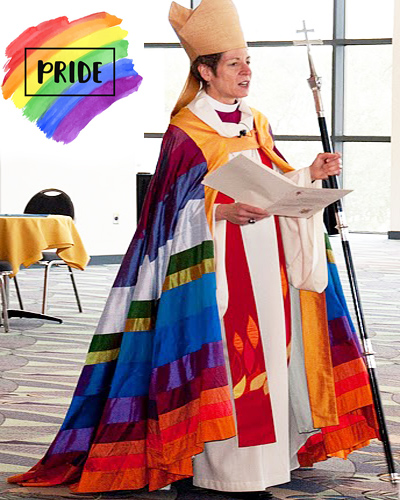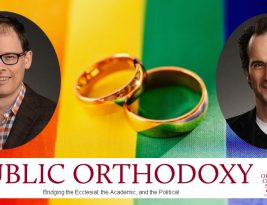 by Fr. Ioannes Apiarius –
by Fr. Ioannes Apiarius –
Ms. Ashley Purpura, Ph.D. recently published her outrageous “Beyond the Binary: Hymnographic Constructions of Orthodox Gender” article on “Public Orthodoxy.” Relying on secular LGBT language and concepts, she ridiculously asserted that the “Orthodox understandings of gender span a spectrum of diverse views” and maintained that singing certain liturgical hymns are evidence of “gender-bending” Church traditions! Thankfully, Fr. John Whiteford easily dissected her absurd claims and exposed Ms. Purpura’s blasphemous tendencies (see: Public Orthodoxy: Promoting Cultural Marxism and LGBT Blasphemy).
It turns out Ms. Purpura specializes in distorting and attacking Orthodox Church right order, teaching, and theological Traditions. In her dissertation, titled Flexible Fixity: Theorizing, Realizing, and Negotiating Byzantine Ideals of Ecclesiastical Hierarchy, submitted in support of her Ph.D. from Fordham University in 2014, she challenges the “male-generated and delienated tradition” used to justify a male only priesthood, bemoans the “problem of hierarchic exclusivity,” and advocates for the reevaluation of the outdated Church tradition of ordaining only men as deacons, priests, and bishops.
Here’s a brief overview of Purpura’s claims from pages 29-32 of her dissertation (full excerpts provided below):
- there is a problem of hierarchic exclusivity (i.e. excluding women from the ranks of clergy and bishops)
- the women’s exclusion from the priestly and episcopal ranks only appears historically normative [meaning this exclusion is not “normal” historically]
- When present-day women question this exclusivity, similar to questioning the clerical hierarchy as a whole, there is a vague and unsatisfying response.
- the lack of serious engagement with feminist concerns is likely one of the reasons Orthodox scholarship had been, until recently, often viewed as disjointed from the rest of religious studies (and the modern world), as stagnantly navel-gazing back at Byzantium.
- Appeals to “tradition” to justify this exclusion are particularly frustrating to present-day Orthodox women as it is a seemingly male-generated and delineated tradition being used to justify a male articulated response for why women should continue to be excluded from the higher ranks of ecclesiastical leadership.
- Previous attempts to address the “issue” of women and the priesthood have proved unsatisfactory on many sides precisely because they have appealed to historical tradition rather than theological tradition.
- Any arguments [against women clergy] made from historical tradition alone rely on exceptionality and economic outliers, and can thus be found insufficient or anachronistic and thus easily dismissible.
- The question of hierarchic exclusivity also needs to be reevaluated historically and currently in the Byzantine theological tradition among the laity and the priesthood more broadly.
- These issues [women priests and bishops] and the justification for their implementation historically and in present communities of Byzantine tradition need to be reevaluated through a deeper analysis of the theology of ecclesiastical hierarchy and its application in the theological tradition.
Apparently, Ashley Purpura is a protégé of George Demacopoulos, the man behind the notorious “Public Orthodoxy” blog that regularly attacks the right theology and Traditions of the Orthodox Church. Public Orthodoxy “consistently promotes the LGBTQWXYZ agenda, not to mention pretty much everything else they publish contrary to actual Orthodox Christian teaching,” warns Fr. John Whiteford. In the Acknowledgments section of her dissertation, Purpura writes: “I am deeply grateful for all who have inspired my academic pursuits, supported my efforts, and helped me to complete this dissertation. It would not have been possible without the ever patient and critically insightful guidance of my mentor, Professor George Demacopoulos.”
The mentorship of George Demacopoulos is bearing more rebellious fruit!
![]()
Flexible Fixity: Theorizing, Realizing, and Negotiating Byzantine Ideals of Ecclesiastical Hierarchy
By Ashley Marie Purpura
Dissertation – Submitted in Partial Fulfillment of the Requirement for the Degree of Doctor of Philosophy in the Department of Theology at Fordham University, New York, August 2014 (from pages 29-32)
Page 29
Problem of Hierarchic Exclusivity
A second problem of hierarchy that arises if one conceives of hierarchy as primarily the ecclesiastical leadership of a religious community is that of exclusion. In the Byzantine tradition certain ranks of the hierarchy are closed to certain categories of people. Most significant for present-day discourse in this regard is the issue of women and the priestly rank of presbyter.
Historically, this exclusion does not garner much attention, likely because it was a reflection of a social norm. Byzantine Christianity has a historical tradition of an ordained female deaconate, but the liturgical function of these women was arguably never viewed as a stepping stone to the priesthood or episcopacy as the male deaconate (somewhat erroneously) came to be, so that women’s exclusion from the priestly and episcopal ranks appears historically normative. 75
For a number of reasons, the female deaconate became a rarity and has practically disappeared at present in the Eastern Orthodox Churches so that all ordained ranks of the Byzantine clergy are in present practice male, even though the rite of female ordination to the deaconate remains “on the books” so to speak. 76
Page 30
When present-day women question this exclusivity, similar to questioning the clerical hierarchy as a whole, there is a vague and unsatisfying response. With a few exceptions, the lack of serious engagement with feminist concerns is likely one of the reasons Orthodox scholarship had been, until recently, often viewed as disjointed from the rest of religious studies (and the modern world), as stagnantly navel-gazing back at Byzantium.
Appeals to “tradition” to justify this exclusion are particularly frustrating to present-day Orthodox women as it is a seemingly male-generated and delineated tradition being used to justify a male articulated response for why women should continue to be excluded from the higher ranks of ecclesiastical leadership. 77
Furthermore, the common deference to “tradition” as a means of excluding women from the ranks of the ordained, glosses over the abundance of evidence that there is a historical, traditional, precedent of ordaining women to the priesthood at the rank of the deaconate. The historically Eastern Orthodox tradition, rather, has within it a potential for renewed inclusivity not found in the Christian West, because it has a tradition of women’s priestly ordination to the rank of deacon.
The issue then remains, what to do with the inclusivity of this historical tradition and how to understand the exclusivity in the modern age. With innovation being the suspect marker of heresy, and continuity with historical tradition the often the harbinger of sanctity, any discussion of hierarchy that does not affirm the status quo appears precariously situated in relation to orthodoxy.
Tradition, however, if determined by unchanging theological content which is manifest in a divinely infinite variety of forms, rather than unchanging historical forms, could in fact offer a more satisfying, theologically consistent, and refreshingly innovative way of answering the question of hierarchical exclusion based on natural embodied difference.
Page 31
Previous attempts to address the “issue” of women and the priesthood have proved unsatisfactory on many sides precisely because they have appealed to historical tradition rather than theological tradition. Appeals to motherhood and virginity are inspiring to some, but far from appeasing the calls for change heralded by those injured by seeming inexplicable and unjustified exclusion.
Explorations of the female deaconate, women’s musical contributions, empresses’ authority, Syrian pneumatology, hagiographic tropes, virginity, and divine motherhood are all valuable contributions in locating resources for Orthodox women’s meaning-making, but these cannot be the sources of justification either for the inclusion or exclusion of women from the priesthood, because they fall short of shifting the discourse off the locus of historical tradition instead of the divinely reflective and therefore eternally unchanging and theologically determinative conception of the tradition of hierarchy. 78
Any arguments made from historical tradition alone rely on exceptionality and economic outliers, and can thus be found insufficient or anachronistic and thus easily dismissible. If hierarchy in the Byzantine theological tradition is revisited as being not fixed in human content, but rather a signifier for the authentic communication of divinity (both in image and sacramental substance), then hierarchy’s form and content may be determined in more flexible and inclusive ways, and bring the conversation about gender to a decisive ground by locating the determinate of hierarchy’s content in the divine image itself.
Pages 32-33
In addition to the exclusion of women from the priestly hierarchic ranks, the episcopal ranks are exclusive even among men—being reserved for the unmarried celibate male in current practice despite a rich history of married bishops.79 The practical need for celibate bishops has developed theological justification, but the question remains if this development is theologically essential and immovable, or if it was a historical accommodation to express the truth in a particular time, which now could be adapted or changed to express the same theological reflectivity more precisely. 80
If the rule is to be maintained for the benefit and authenticity of the church then it needs to be divinely and theologically determined and grounded, opposed to being perpetuated based on historical circumstance. The authors examined in this dissertation nowhere specify the marital state of the hierarch, but do specify the hierarch’s divine reflectivity.
The question of hierarchic exclusivity also needs to be reevaluated historically and currently in the Byzantine theological tradition among the laity and the priesthood more broadly. Even the male priesthood has additional exclusivity within it. Men may be excluded as candidates for the priesthood based on marital, familial, and physical impediments. Lay men and women are similarly restricted, at least historically and canonically from certain types of sacramental participation and contact at certain times of perceived states of diminished personal integrity or wholeness (for example bleeding, seminal fluids, bathing, birth, manslaughter), which perhaps, again pastorally appropriate, reflects some sort of ambiguity surrounding the relationship between ecclesiological participation and sacramental validity. 81
These issues and the justification for their implementation historically and in present communities of Byzantine tradition need to be reevaluated through a deeper analysis of the theology of ecclesiastical hierarchy and its application in the theological tradition.
________________________________
Content has been reproduced as it appeared in the actual published dissertation. Some of the paragraphs were broken into smaller paragraphs for readability. Some words or phrases were bolded for emphasis. Bolded page numbers headings were added for clarity. Pull-quotes were also added for additional emphasis.
The numbers at the end of certain sentences represent numbered footnotes. Those footnotes were not reproduced here for brevity.




Behind every raging feminist, there is an effeminate manhating “man” ( like George Demacopoulos ) with a questionable personal life who uses her as his sockpuppet. EVERY-SINGLE-TIME.
You can recognize these liars on which words they often use to assault and accuse others; inevitable, always, excluding, appropriate, equality, marginalized et cetera.
Anyone claiming that women should be ordained priests knows nothing about the Aaronic priesthood of the Old Covenant, the nature of man being from God and woman being from man, nor do they understand that there should be no mingling of the blood from a woman with the pure blood of Christ. They disregard the full meaning of the New Covenant and the real Sacrificial nature of the Holy Sacrifice of the Mass. They do not understand the priesthood. You cannot explain the theological nature of something so logical, reasonable, rational and sensical to those who do not have the ears to hear nor the mind to comprehend the things of God. They do not understand infallible or fallible. A woman is not called to the Sacred order of priest. End of story!!! What mankind is trying to impose upon the world is against Divine Law!!! We are living during the time of times.
As with all things demonic, this too should not be engaged. These poor souls live in an echo chamber, and it’s a waste of time to do anything but pray for them.
The Church and the rational flock must be warned about these false teachers. “Not only for every idle word must man give an account, but for every idle silence.” ~ St. Ambrose
Also, God expects us to bear witness to the truth. “Good philosophy must exist, if for no other reason, because bad philosophy needs to be answered. The cool intellect must work not only against cool intellect on the other side, but against muddy heathen mysticisms which deny intellect altogether. ” ~ C.S. Lewis
I agree. These aberrations do need to be publicly addressed, for they threaten to confuse and weaken the resistance of our clergy and laity against such attacks on our Holy Faith.
In another Orthodox forum discussion someone asked what is Ashley Purpura’s purpose in promoting these kinds of non-Orthodox ideas.
I believe Ashley Purpura’s purpose is to:
(1) make a name for herself,
(2) make money (job at progressive university, publish books, give talks, etc.),
(3) impress her liberal/progressive pro-LGBTQWXYZ academic peers,
(4) turn the Orthodox Church into the Episcopalian Church.
http://www.aoiusa.org/fr-robert-arida-why-dont-you-become-episcopalian/
Curiously, for a paper that aims to correct issues in the Orthodox pastorate, this whole discussion seems to have *no pastoral aspect.* It seems to be concerned with questions of academic integrity or of access to positions of perceived authority, rather than about serving human beings for their salvation. Someone has misunderstood the purpose of ordination.
Ashley Purpura is a perfect example of the misguided advocates of women’s ordination who support a non-Orthodox view and are unaware of their own cultural “conditioning” and their own surrender to secular culture, that Fr. Schmemann warned us about:
“It is well known that the advocates of women’s ordination explain the Scriptural and the traditional exclusion of women from ministry by “cultural conditioning.” If Christ did not include women into the Twelve, if the Church for centuries did not include them into priesthood, it is because of “culture” which would have made it impossible and unthinkable then. It is not my purpose to discuss here the theological and exegetical implications of this view as well as its purely historical basis, which incidentally seems to me extremely weak and shaky; what is truly amazing is that while absolutely convinced that they understand past “cultures,” the advocates of women’s ordination seem to be totally unaware of their own cultural “conditioning” of their own surrender to culture.” ~ Fr. Alexander Schmemann
Inquisitively, for a paper that expects to amend issues in the Orthodox pastorate, this entire exchange appears to have *no peaceful aspect.* It is by all accounts worried about inquiries of scholastic trustworthiness or of access to places of saw expert, instead of about serving people for their salvation. Somebody has misjudged the reason for appointment.
Ms. Purpura would make an excellent Episcopalian! I suggest that she immediately leave the Church and join one of their “welcoming” congregations.
For a website whose banner cautions against idle silence *and* idle words, the comment boxes at OrthodoxyToday.org are suspiciously full of idle gossip, speculation about motives, inferences about spiritual and intellectual deficits and such. It’s shameful.
John, It would help if you would offer something substantive to the discussion to address the actual heretical and un-Orthodox teaching of Ms. Purpura, instead of moralistic shaming and finger wagging.
Agree.
What Peace between Light and Darkness?